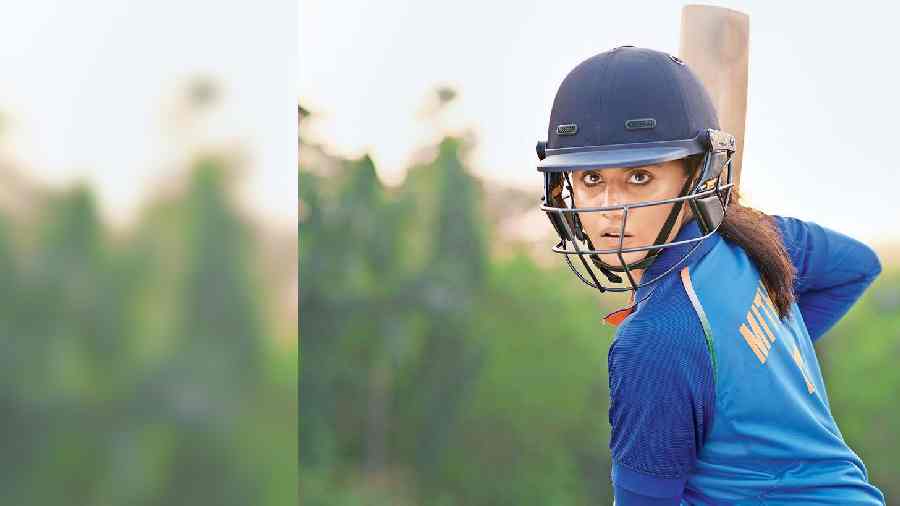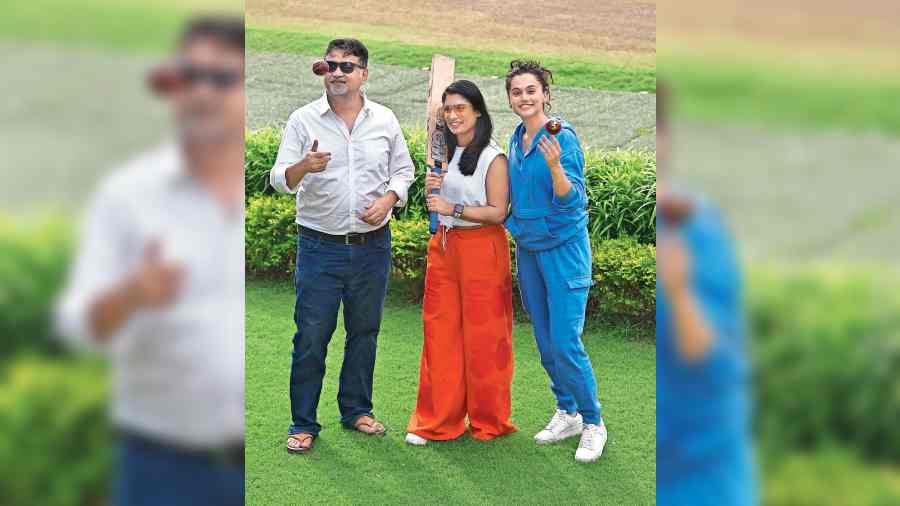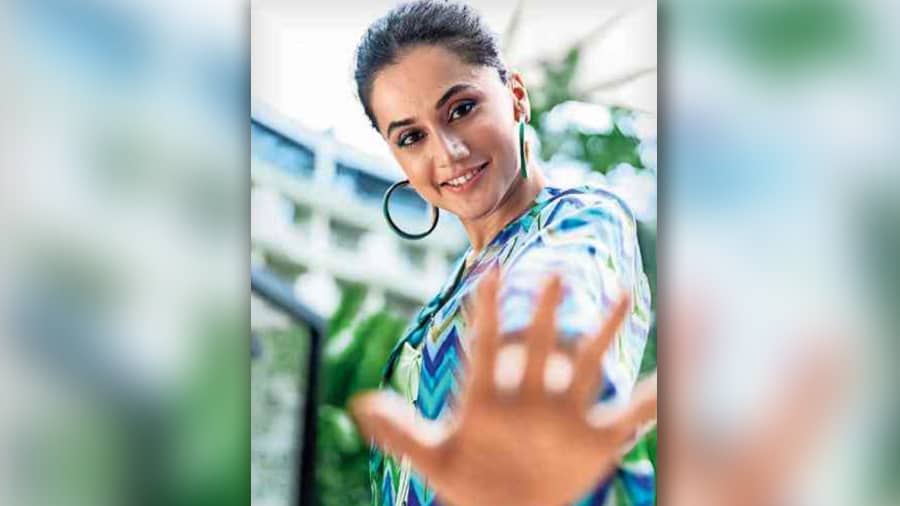A Taapsee Pannu Friday is always a good Friday. So we are hoping it will be on July 15, with the actor’s willow walk and talk as former Indian cricket captain Mithali Raj — considered to be one of the greatest female cricketers ever — coming alive on screen in Shabaash Mithu.
On Saturday, Taapsee — along with Mithali and the film’s director Srijit Mukherji — made a pit stop at the city’s iconic Eden Gardens to promote the film. Post that, t2 caught up with Taapsee for a freewheeling chat on effortlessly embracing a difficult part once again, why it’s important for her that the audience has expectations from a Taapsee film and what it means being a part of a film like Dunki, her first film with Shah Rukh Khan.
Your last theatrical release was Thappad in March 2020, and then the pandemic hit. Since then, you have had streaming releases in the form of Haseen Dillruba, Annabelle Sethupathi, Rashmi Rocket and Looop Lapeta. With Shabaash Mithu in cinemas this Friday, do the emotions brought on by a theatrical release hit different?
It is very different. The pre-release jitters are very different. On OTT, a film is there for posterity... you know that sooner or later it will be watched. It’s not about the first weekend or the first week and that it will be taken off if it doesn’t do well... that fear is not there with a release on OTT. People can watch it at leisure and in their own comfort... eventually, it will find its audience.
With a theatrical release, the stakes are very high. One, it is available for a limited time period, there are limited shows and the window to judge the performance of a film is very little. The repercussions are very immediate. The performance of your film on the big screen is a validation of someone’s stardom. All these parameters are very brutal, I feel. Hence, the jitters are very different.
With an OTT release, one is relaxed, even complacent after a point. But the pressure of the box office is very real in a big-screen release.
When did you first hear of Mithali Raj?
I first heard of her when she made that iconic statement (“Do you ask the same question to a male cricketer? Do you ask them who their favourite female cricketer is?”) when she was asked to name her favourite male cricketer. Honestly, I didn’t know about her or the women’s cricket team before that. It was this statement that made me take notice of her and the fact that we have a women’s team and how well it had been doing. I felt so guilty of the fact that I probably manifested this film coming to me (smiles). I am glad I could use this medium to correct my mistake, in a way. After this film, I hope that not many will stay oblivious to the Indian women’s cricket team.
Your director Srjit Mukherji is an avid follower of the game. How much did you think that contributed to his film-making in Shabaash Mithu?
For our first meeting, Srijitda came home for a cup of coffee and we only spoke about how I see the game and how much I have learnt about it. On set, after giving a shot, I don’t look at the monitor. In this film, I told him, ‘Sir, you make me do a shot as many times as you want to, but don’t stop till it’s perfect... I will keep going’. I didn’t want anyone to say that just because it’s a girl playing cricket on screen, she didn’t do it well enough.
This will be the first film here on women’s cricket, focused on someone who I feel is the ‘first lady’ of women’s cricket in a way, and so I didn’t want to go wrong technically.
So in that sense, I was very much at ease because of Srijit sir’s love for cricket. He calls cricket his first love, followed by movies. I knew that this man won’t let the cricket in the film go wrong for sure.
Every film of yours comes with a certain level of expectations. You are expected to play parts that are meaty and gritty. Does that prevent you from even looking at the so-called flaky parts now, like what you did for instance in Judwaa 2?
Honestly, those kind of films don’t come to me at all. Even before, they didn’t. Judwaa (2) was probably the only one of that kind that came my way, even back then and that was also because I had worked with David sir (Dhawan, director) before (in her Bollywood debut Chashme Baddoor). There was a certain kind of comfort there. Barring that, I don’t even get those kinds of roles, so there is really no option of choosing or not (smiles).
Also, I am very happy and blessed that people have some expectations from me. The audience has expectations only from artistes who are relevant. I think it’s very difficult to get to that point in your career where people expect certain things from you and your films. I have worked very hard to reach this level, and I would always want my audience to have expectations from my work.
But would you want to do, for want of a better word, a flippant role just to have fun and shake things up a little?
Not really, you know. I like doing comedy, and I have done comedy. I can also do a comedy film where I don’t have to be the butt of jokes all the time. In my upcoming film Woh Ladki Hai Kahaan (co-starring Pratik Gandhi), you will see me doing a lot of comedy. Even in Dunki (co-starring Shah Rukh Khan), there is comedy, although my character has a lot of gravitas.
I don’t believe in doing flippant roles just to lighten it up... there are enough genres and enough roles to do out there. I did Dobaara (directed by Anurag Kashyap) between Rashmi Rocket and Shabaash Mithu. Both these films were very heavy on me physically and mentally, and I did Dobaara in between just to lighten things for myself because it’s a plot-driven, and not a character-driven film.
Over the last few years, you have been spiralling from one film to the next, which is always a good thing. Do you feel the need to take a break now, or do your frequent travels take care of that? I loved your recent pictures in Denmark!
That’s the idea! (Laughs) Every time I finish a film, I go off on a holiday. I was following that formula diligently till Covid hit. Before that, in a calendar year, I would keep aside a sizeable number of days for travel. And then the lockdown happened. But after we started working again, I had back-to-back films, which I had committed to earlier but which had piled up together, to finish. But now that backlog is over for me and since I have started shooting for Dunki, it’s been relatively easy.
Do you like that or do you thrive more in chaos?
No, I like my breaks. I enjoy my work and I am in no hurry. I like to enjoy the process. I am not an actor who is doing films to become No 1 or to have a certain kind of bank balance. That’s not why I wanted to become an actor. As a kid, I never cherished the dream of becoming an actor and so I don’t really have a goal to reach, nor did I ever dream of stardom. I enjoyed acting and that’s why I continued doing it after my first film. Otherwise I would have gone back to pursuing my MBA (smiles).
You have a bunch of films coming up. Would you count Dunki, directed by Rajkumar Hirani and your first film with Shah Rukh Khan, as the most special among them?
To even get to a film like Dunki means a lot of validation and acknowledgement for me. Honestly, I never really imagined that one day I would feature in a film like this. I never thought I will reach a place where I will have access to this kind of a project. I am not someone who is part of the inner circle of the industry or has inroads in that sense (smiles). I am not someone who is easy to come across when a director of that stature is planning a project.
I was very surprised to receive that call from Raju sir. And I knew that he had approached me on the basis of the work that I had done. I remember him meeting me after Manmarziyaan and then he went back and watched all the ones I had done, even those before Manmarziyaan. That’s so fulfilling as an actor, that one is getting a film like this not because of any recommendation but purely on merit. That is extremely validating.

Taapsee as Mithali Raj in Shabaash Mithu.
What struck you the most about her when you first met her?
That she has tremendous amount of grit. Because of her observational skills, she knows a lot and that has helped the team rise from where it was to get to the 2017 World Cup final, which is the second time the team reached the finals of a World Cup. For the first few years of her career, there was no recording of women’s cricket... I had nothing to take reference from. Only in the last 10 years of her career, we had some footage to follow, and that was mostly around 2017.
So what struck me was her grit, the fact that she has seen so much and yet the thought of giving up never came her way. In the early part of her career, which was probably the most important, there was lack of confidence, trust, validation.... When she was breaking records, there was barely any kind of acknowledgement and validation from the country. And yet, she still kept going. That kind of grit I have felt in her silent moments... because she hardly speaks (laughs). That was something I remember very well after meeting her.
You were trained for the film by Mithali’s colleague and former India player Nooshin Al Khadeer. Did not getting to train under Mithali herself feel like a disadvantage at times?
I would have definitely loved to have known her more as a person. Just have a chat over coffee or dinner or generally. I would have definitely chewed her brains with a million questions! (Laughs) I know that’s primarily the writers’ job to get all those things in the script itself, but as part of prep, I wanted to see her when she is happy, when she is sad, when she is disappointed, and all of that. I wanted to know her more as a woman. I didn’t have the chance to do that.
But I am always a glass-half-full kind of person. And what happened was when Nooshin came on board to train me, she gave me the kind of information about Mithali which I feel even Mithali wouldn’t have been able to. When a third person tells you about someone they have known for decades, the information is richer. For instance, my friend will probably be able to tell you more about me and my journey than I can about myself. So having Nooshin around was a blessing in disguise for me, in a way.

Taapsee Pannu with Srijit Mukherji and Mithali Raj at Eden Gardens on Saturday. Picture: B. Halder
Your director Srjit Mukherji is an avid follower of the game. How much did you think that contributed to his film-making in Shabaash Mithu?
For our first meeting, Srijitda came home for a cup of coffee and we only spoke about how I see the game and how much I have learnt about it. On set, after giving a shot, I don’t look at the monitor. In this film, I told him, ‘Sir, you make me do a shot as many times as you want to, but don’t stop till it’s perfect... I will keep going’. I didn’t want anyone to say that just because it’s a girl playing cricket on screen, she didn’t do it well enough.
This will be the first film here on women’s cricket, focused on someone who I feel is the ‘first lady’ of women’s cricket in a way, and so I didn’t want to go wrong technically.
So in that sense, I was very much at ease because of Srijit sir’s love for cricket. He calls cricket his first love, followed by movies. I knew that this man won’t let the cricket in the film go wrong for sure.
Every film of yours comes with a certain level of expectations. You are expected to play parts that are meaty and gritty. Does that prevent you from even looking at the so-called flaky parts now, like what you did for instance in Judwaa 2?
Honestly, those kind of films don’t come to me at all. Even before, they didn’t. Judwaa (2) was probably the only one of that kind that came my way, even back then and that was also because I had worked with David sir (Dhawan, director) before (in her Bollywood debut Chashme Baddoor). There was a certain kind of comfort there. Barring that, I don’t even get those kinds of roles, so there is really no option of choosing or not (smiles).
Also, I am very happy and blessed that people have some expectations from me. The audience has expectations only from artistes who are relevant. I think it’s very difficult to get to that point in your career where people expect certain things from you and your films. I have worked very hard to reach this level, and I would always want my audience to have expectations from my work.
But would you want to do, for want of a better word, a flippant role just to have fun and shake things up a little?
Not really, you know. I like doing comedy, and I have done comedy. I can also do a comedy film where I don’t have to be the butt of jokes all the time. In my upcoming film Woh Ladki Hai Kahaan (co-starring Pratik Gandhi), you will see me doing a lot of comedy. Even in Dunki (co-starring Shah Rukh Khan), there is comedy, although my character has a lot of gravitas.
I don’t believe in doing flippant roles just to lighten it up... there are enough genres and enough roles to do out there. I did Dobaara (directed by Anurag Kashyap) between Rashmi Rocket and Shabaash Mithu. Both these films were very heavy on me physically and mentally, and I did Dobaara in between just to lighten things for myself because it’s a plot-driven, and not a character-driven film.
Over the last few years, you have been spiralling from one film to the next, which is always a good thing. Do you feel the need to take a break now, or do your frequent travels take care of that? I loved your recent pictures in Denmark!
That’s the idea! (Laughs) Every time I finish a film, I go off on a holiday. I was following that formula diligently till Covid hit. Before that, in a calendar year, I would keep aside a sizeable number of days for travel. And then the lockdown happened. But after we started working again, I had back-to-back films, which I had committed to earlier but which had piled up together, to finish. But now that backlog is over for me and since I have started shooting for Dunki, it’s been relatively easy.
Do you like that or do you thrive more in chaos?
No, I like my breaks. I enjoy my work and I am in no hurry. I like to enjoy the process. I am not an actor who is doing films to become No 1 or to have a certain kind of bank balance. That’s not why I wanted to become an actor. As a kid, I never cherished the dream of becoming an actor and so I don’t really have a goal to reach, nor did I ever dream of stardom. I enjoyed acting and that’s why I continued doing it after my first film. Otherwise I would have gone back to pursuing my MBA (smiles).
You have a bunch of films coming up. Would you count Dunki, directed by Rajkumar Hirani and your first film with Shah Rukh Khan, as the most special among them?
To even get to a film like Dunki means a lot of validation and acknowledgement for me. Honestly, I never really imagined that one day I would feature in a film like this. I never thought I will reach a place where I will have access to this kind of a project. I am not someone who is part of the inner circle of the industry or has inroads in that sense (smiles). I am not someone who is easy to come across when a director of that stature is planning a project.
I was very surprised to receive that call from Raju sir. And I knew that he had approached me on the basis of the work that I had done. I remember him meeting me after Manmarziyaan and then he went back and watched all the ones I had done, even those before Manmarziyaan. That’s so fulfilling as an actor, that one is getting a film like this not because of any recommendation but purely on merit. That is extremely validating.
